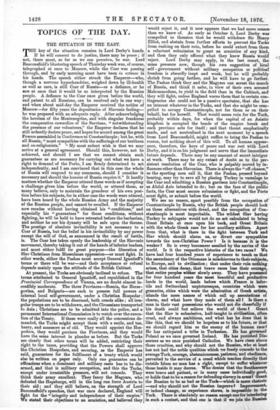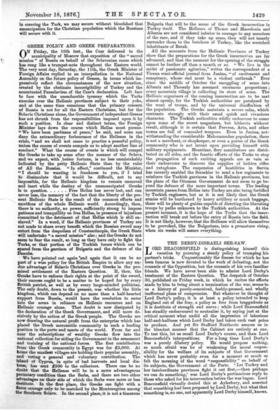TOPICS OF THE DAY.
THE SITUATION IN THE EAST.
THE key of the situation remains in Lord Derby's hands. If he will consent to do justice, there may be peace ; if not, there must, so far as we can perceive, be war. Lord Beaconsfield's blustering speech of Thursday week was, of course, telegraphed at once to Moscow, while the Czar was passing through, and by early morning must have been in extenso in his hands. The speech either struck the Emperor—who, though a nervous hypochondriac, weighed down by ill-health as well as care, is still Czar of Russia—as a defiance, or he saw at once that it would be so interpreted by the Russian people. A defiance to the Czar once given before the world, and patent to all Russians, can be received only in one way ; and when about mid-day the Emperor received the nobles of Moscow—for fifty years the depositaries of Slavonic feeling— he was prepared with an adequate reply. After acknowledging the heroism of the Montenegrins, and with singular frankness the comparative cowardice of the Servians, "notwithstanding the presence of our volunteers," the Emperor declares that he still ardently desires peace, and hopes for accord among the great Powers assembled in Conference n,t Constantinople; but he, with all Russia, "must sympathise with the sufferings of our brethren and co-religionists." "My most ardent wish is that we may arrive at a general agreement. Should this, however, not be achieved, and should I see that we cannot obtain such guarantees as are necessary for carrying out what we have a right to demand of the Porte, I am firmly determined to act independently, and I am convinced that in this case the whole of Russia will respond to my summons, should I consider it necessary and should the honour of Russia require it." It hardly matters whether the Emperor uttered these words as if accepting a challenge given him before the world, or uttered them, as many believe, only to maintain the grandeur of his own posi- tion before his subjects, for in either case the words were uttered, have been heard by the whole Russian Army and the majority of the Russian people, and cannot be recalled. If the Emperor now recedes without having obtained his "conditions," and especially his " guarantees " for those conditions, without fighting, he will be held to have retreated before the barbarian, and neither he nor his dynasty will be safe upon the throne. The prestige of absolute invincibility is not necessary to a Czar of Russia, but the belief in his invincibility by any power except the will of God, as announced in the result of battle, is. The Czar has taken openly the leadership of the Slavonic movement, thereby taking it out of the hands of inferior leaders, and must either fulfil its great purpose—the liberation of Slav Christians from Mussulman oppression—or must fight. In other words, either the Pashas must accept General Ignatieffs terms or there will be war—and their acceptance or refusal depends mainly upon the attitude of the British Cabinet.
At present, the Turks are obviously inclined to refuse. The terms attributed to General Ignatieff, and republished in the Provincial Correspondence of Vienna, are no doubt almost in- credibly moderate. The three Provinces—Bosnia, the Herze- govina, and Bulgaria—are each to possess full powers of internal local self-government, under a Christian Hospodar ; the populations are to be disarmed, both creeds alike ; all irre- gular troops are to be withdrawn, and the Circ,assians transported to Asia ; Christians are to be admitted into the police, and a permanent International Commission is to watch over the execu- tion of the Treaty. If these were really all the concessions de- manded, the Turks might accept them with a smile, and tax, harry, and massacre as of old. They would appoint the Hos- podars, they would garrison the Provinces, and they would have the same interest in plunder as before. But the Turks see clearly that other terms will be added, restricting their right to the taxes, providing that the Powers shall approve
the Christian Hospodars, and securing, as the Emperor has said, guarantees for the fulfilment of a treaty which would else be written on paper only. Only one guarantee can be efficacious when a dominant and military caste has to be dis- armed, and that is military occupation, and this the Turks, except under irresistible pressure, will not concede. They think their army excellent. They fancy the Magyars, who defeated the Hapsburgs, will in the long run force Austria to their aid ; and they still believe, on the strength of Lord Beaconsfield's speeches, that war once declared, England will fight for the "integrity and independence of their empire." We stated their objections to an armistice, and believed they
would reject it, and it now appears that we had more reason than we knew of. As early as October 5, Lord Derby was compelled to threaten that he would withdraw Sir Henry Elliot, and abstain from further efforts to prevent the Turks from rushing on their ruin, before he could extort from them a reluctant submission to grant an armistice of any kind, and then they only offered what they knew Russia would reject. Lord Derby may apply, in the last resort, the same pressure now, though his own suggestion of kcal self - government without military occupation or political freedom is absurdly inept and weak, but he will probably shrink from going farther, and he will have to go farther. The Pashas think they and the Magyars can arrest the march of Russia, and think it safer, in view of their own aroused Mahommedans, to yield in the field than in the Cabinet, and they will fight, unless England warns them that in certain con- tingencies she could not be a passive spectator, that she has no interest whatever in the Turks, and that she might be com- pelled to occupy Constantinople, not for them or on their behalf, but for herself. That would mean ruin for the Turk, probably within days, for when the capital of an Asiatic kingdom is occupied the bonds of the empire break and each province acts for itself ; and that threat emphatically made, and not neutralised in the next moment by a speech from Lord Beaconsfield, might suffice to bring the Pashas to reason, but nothing short of this will. To all human appear- ance, therefore, the keys of peace and war rest with Lord Derby, and it is on his judgment and nerve that the immediate future depends. There may be any amount of secret intrigue at work. There may be any extent of doubt as to the per- sistent resolution of the Czar, who is palpably moved by in- fluences other than Slavonian. There is always the "off-chance," as the sporting men call it, that the Pashas, pressed beyond bearing, may try to save all by placing Turkey in vassalage to the Czar and admitting a Russian garrison into Constantinople, as Abdul Aziz intended to do; but on the face of the public- facts, the Czar must secure submission or fight, and the Porte must fight, or submit before the world.
We see no reason, apart possibly from the occupation of Constantinople by Russia, why the British people should look on these alternatives with dread, and the occupation of Con- stantinople is most improbable. The wildest Slav having- Turkey to subjugate would not do an act calculated to bring Great Britain at once upon his back, and Great Britain with the whole Greek race for her auxiliary soldiers. Apart from that, what is there in the fight between Turk and Slav which should alarm us, or divert our sympathies towards the non-Christian Power? Is it because it is the weaker? So is every buccaneer assailed by the navies of the world. Is it the respective histories of the two races? We have had four hundred years of experience to teach us that the ascendancy of the Ottomans is mischievous to their subjects, to Europe, and to civilisation • that under their rule nothing arises, that cities decay, that brave races lose their courage, that entire peoples wither slowly away. They have possessed for four hundred years the most beautiful and productive lands in the world, lands before which France is infer- tile and Switzerland unpicturesque, countries which were granaries, cities which were the admiration of Greek artists, islands the mere names of which call up associations of charm, and what have they made of them all Is there a man in their vast possessions who would not die cheerfully if his death could but relieve the world of them? Grant that the Slav is submissive, half-taught in civilisation, often cruel, and always ambitions, and what has he done that is like this, that we should be hopeless as to his future, or that we should regard him as the enemy of the human race? He has extirpated a tribe in Turkestan. He has governed Poland as we once governed Ireland. He has punished Dis- senters as we once punished Catholics. We have risen above those cruelties, and why should not the Russian, who at least has not had the noble qualities which ,ye freely concede to the average Turk, courage, abstemiousness, patience, and obedience, perverted to the service of a creed which teaches directly that outside Islam no man has a right, except to suffer whatever those inside it may decree. 'Who denies that the Southerners were brave and patient, or in many cases individually good, or holds that to be a reason for defending slavery in arms? Grant the Russian to be as bad as the Turk—which is mere rhetoric —and why should not the Russian improve V Improvement, or indeed change, as experience shows, is impossible to the Turk. There is absolutely no reason except one for interfering in such a contest, and that one is that if we join the Russian
in coercing the Turk, we may secure without bloodshed that emancipation for the Christian population which the Russians will secure with it.







































 Previous page
Previous page